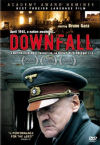
Der Untergang, as it is titled in the original German, is far more than just another movie about Adolph Hitler and World War II. It is a compelling and enlightening view of the last days of the German war machine as viewed from within the Berlin bunker sheltering the Nazi dictator. Based upon the diary and recollections of Traudl Junge, Hitler’s last secretary before his suicide, as well as other sources, Downfall is a sober look at the final days of the Third Reich and its eventual self-decapitation and defeat.
This is not specifically about World War II or the atrocities perpetrated throughout the conflict. Only a few minor glancing blows are given to those issues, and only insomuch as they support events within the bunker itself. The movie is instead a telling of Hitler’s mental breakdown as the Russian and Allied armies squeeze Berlin between them, and the effect he had on those around him. While filmed in German, it is subtitled in English.
Empowered by a phenomenal portrayal of Der Führer as his country is destroyed around him and his own mind begins to break, it is both interesting and disturbing to see the man’s emotional state as it swings like a pendulum between fierce defiance and suicidal depression. His control over the war and his own officers continually slips away as each day passes, yet Hitler himself struggles both with denial of the truth and betrayal by his own military leaders. That betrayal is, however, equal parts reality and imagination for the once great dictator. Trapped in the bunker by his own decision to remain in Berlin as a sign of strength and impending victory for the German people, the outrageous psychological mayhem he experiences makes clear his own lack of mental stability.
Yet it is not solely about Hitler and his end, although that is the primary focus. Also brought to the forefront is the horrific mindset that befell Germany’s upper echelon and military leadership as they realized the hopelessness of their own master plan. A significant aspect of this is demonstrated through the waining grip on reality shared amongst many in the bunker. There is the blind resolution to follow their leader regardless of his apparent mental disintegration. There is the throwing of parties filled with drinking and dancing as bombs explode all around them. There is the decision by many, as part of an admission of the horrors they inflicted upon the world, to end their own lives when the hopelessness became undeniable. There is the self-deluded compassion that brings some to murder their own children as a form of protection. And the list goes on.
It is both disturbing and enlightening to see the events unfold. It also raises a great many questions about the course of the war had the Nazi leader not encountered such all-consuming psychosis, an affliction shared with many in his closest circle of advisers, officers, and friends. With the human aspect so vividly displayed, it is almost possible to feel sorry for some involved in those final days and hours.
Opening and closing remarks by the real Traudl Junge masterfully encapsulate the film with the heartfelt reflections of someone who still struggles with her own involvement, even as a personal secretary, and punctuate the emotional mayhem caused by a single man focused on world domination.
I can not recommend this movie enough. It is a superbly acted and directed masterpiece.